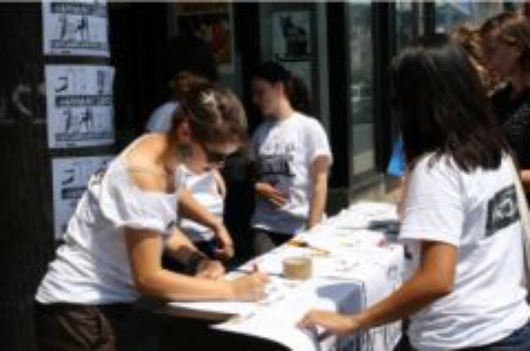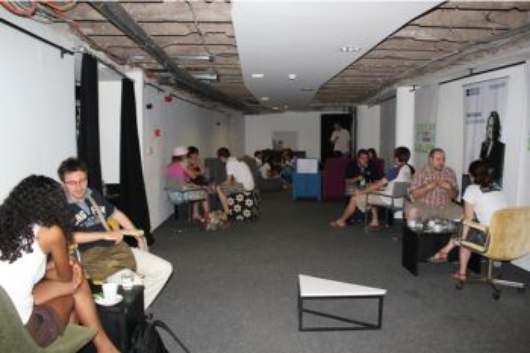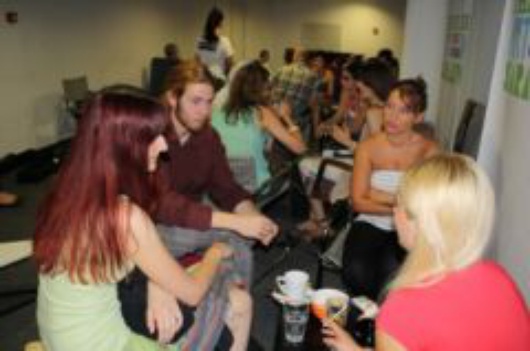Sarajevo’s Human Library
Published on
By Lamija Landzo
In Sarajevo, one often hears wistful stories about the old days, better times, which praise their life styles. According to those who narrate these tales, our generation is deprived because of the internet. We are slaves to consumerism and a fast-paced style of life. Our generation, they say, has forgotten some deep values and beauty.
 Although I always feel strong animosity towards overgeneralizations like those, maybe we have bitten too hard into the capitalistic lifestyle. For instance, many claim that we are forgetting to enjoy the charm of the written word, and that reading is rarely a daily activity. The books that we do find in our hands are superficially consumed, their content is swallowed without plunging deeper into the meaning and the message. We then sort them on some bookshelves, lining them according to their colors, sizes, drawings on cover sheets, creating just one more decoration for our home.
Although I always feel strong animosity towards overgeneralizations like those, maybe we have bitten too hard into the capitalistic lifestyle. For instance, many claim that we are forgetting to enjoy the charm of the written word, and that reading is rarely a daily activity. The books that we do find in our hands are superficially consumed, their content is swallowed without plunging deeper into the meaning and the message. We then sort them on some bookshelves, lining them according to their colors, sizes, drawings on cover sheets, creating just one more decoration for our home.
If we transfer this statement to our interpersonal relationships, imagining that every human is a special book composed of their own experiences, it is not so hard to claim that we have become superficial to one another. We constantly sort humans according to their cover sheets, filing them away on our mind shelves without seeking deeper meaning or pursuing greater knowledge, without even questioning whether our judgments are right or wrong.
Yes, I am talking about prejudices and discrimination, developed due to the lack of deeper communication with the ones from whom we differ.
My frustration with the multitude of phobias in my city encouraged me to become a part of the project Sarajevo Human Library, which I will seek to present in the text that follows.
Once upon a time in Copenhagen
 The project Human Library aims to encourage dialogue between different groups of people, and to open honest channels of communication in a safe and friendly atmosphere. The dialogue offers a unique opportunity to ask questions that always intrigued us, but we did not have the chance or courage to pose them. The idea is that members of different groups (religious, sexual, different life styles, occupations, hobbies, and such) open their lives as books, and to try to answer all the questions of curious visitors. Or if we put it in library metaphor, here readers can read human, living books.
The project Human Library aims to encourage dialogue between different groups of people, and to open honest channels of communication in a safe and friendly atmosphere. The dialogue offers a unique opportunity to ask questions that always intrigued us, but we did not have the chance or courage to pose them. The idea is that members of different groups (religious, sexual, different life styles, occupations, hobbies, and such) open their lives as books, and to try to answer all the questions of curious visitors. Or if we put it in library metaphor, here readers can read human, living books.
The idea for this concept was born in Denmark more than ten years ago. The group of young activists, prompted by the brutal killing of their friend, decided to create a project which would aimed at decreasing prejudices in their community. A decade after, the project has been implemented by youth all around the world, and the methodology is spreading further and further. Nowadays, Human Libraries take place almost every day, and this year in July, it was held in Sarajevo as well.
The library and its librarians
In November last year, my ever-energetic friend Victoire told me about the Human Library for the first time. The methodology seemed interesting, so I agreed to take part in it. I must admit that I was quite skeptical, believing wholeheartedly that the project sounded great, but that my city did not have the mentality for it. Fortunately enough, I overcame my own prejudice as far as that is concerned.
So, let’s present librarians, or organizers and implementers of the project. Victoire Rio comes from France, she is a long-time youth activist in B&H, and at the moment she is working for the OSCE. Valerie Hopkins is an American who lives in Sarajevo, and works as a journalist. We three were in charge of project coordination. Furthermore, we enlisted ten psychology students to help us finding volunteers to serve as “books”, and to organize the event.
The realization of the Sarajevo Human Library would definitely not have been possible without our partnership with the British Council, which generously supported us. The space of the library was Kriterion Art Cinema, who offered us their rooms and support from their magnificent team. I am especially thankful to Lea Jerlagić, who helped us to design our posters and catalogues.
In the world of living books
 Sarajevo Human Library gathered 45 volunteer “books,” who carried their titles proudly. Just to name a few: women wearing head scarves, catholic nuns, priests, members of LGBTIQ population, diplomat, vegetarian, feminist, retired person, atheist, hip- hop artist, model, policemen, etc. During two days of project, we had around 150 “readings,” and our evaluations from both books and readers were extremely positive.
Sarajevo Human Library gathered 45 volunteer “books,” who carried their titles proudly. Just to name a few: women wearing head scarves, catholic nuns, priests, members of LGBTIQ population, diplomat, vegetarian, feminist, retired person, atheist, hip- hop artist, model, policemen, etc. During two days of project, we had around 150 “readings,” and our evaluations from both books and readers were extremely positive.
It was so interesting to observe how quickly people were able to open up to one another to share their experiences, and how the dialogues were followed by the eventual surprises when they realized the wealth of similarities they shared with those who on the outside appeared different. I’m happy to state that lots of lasting friendships were made, and even some ideas for future projects were generated between the books.
The volunteer “books” generously dedicated their time , and I need to congratulate them on their enthusiasm and openness, but on patience as well, considering that many of them told their stories over and over again.
The book is not yet closed
After all the positive experiences that we had, I am motivated to continue the project. Even though I might have been exhausted with all the tasks that I had, I am already nostalgic about it. It was fantastic to meet so many people, to become aware and lessen my own prejudices, and equally wonderful to realize that Sarajevo is more heterogeneous that I previously thought.
The sense of the whole methodology is to try to expand it, which means that the reader of this text can be an implementer as well. If you are interested in implementing this event, or to organize some kind of variation of it, the Sarajevo team would be more than happy to help. If the reader of the text is willing to open their own pages and to tell their story, I strongly encouraging you to be a volunteer in your community.
The last chapter of my impressions
I am not saying that the Human Library is a panacea for prejudices. Above all, it requires time to organize, so it is not instant. Of course we cannot daydream about eradicating stereotypes overnight. I view prejudice as a monster with several heads, which we need to attack from all sides, constantly and with courage, in order to have an impact. Sarajevo Human Library is just one small contribution to that struggle.
And on top of this, maybe we should be reminded once more about the beauty of the written and spoken word. The book that we have read will enrich us, no matter if it is made of paper or of flesh and blood. And do not forget to wipe the dust from your mind shelves, and question if your books are sorted well. You as well would not enjoy being judged by your cover, would you?!!!! ''
The Next Human Library in Sarajevo will probably take place in October. Do not miss it!!''



